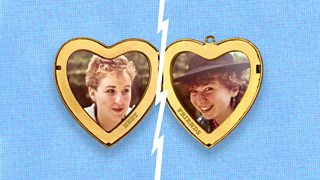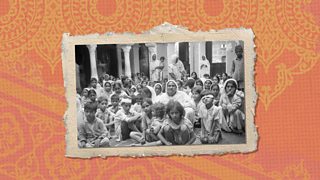‘We wake up in the morning and just jiggle it out!’ Six things we learnt from Motsi Mabuse on Woman’s Hour

If you’re a fan of Strictly Come Dancing, Motsi Mabuse will need no introduction.
The Strictly judge joined Jessica Creighton on Woman’s Hour to discuss how she first started dancing whilst growing up in South Africa, and how she became a Latin dance champion and star of one of the UK’s best loved TV shows.
Motsi also told Jessica about how dancing makes her feel, plus they discussed all things Strictly, as it gears up to begin its 20th series.
Here are some of the things we learned from their conversation…
1. Motsi researches the Strictly celebrities each year to guess who’ll win
“I think everybody does the same,” says Motsi. “As soon as we know the cast, you look on Google and social media, just get yourself busy to get an atmosphere of who they are. You can see by the way they move whether they'll be able to dance or open themselves up to the show.
“I think that's the most important part. If you're really willing to open yourself up, go all the way and risk it, then there's a good chance that the dancing will also become an easier and easier job.”
She also shared her advice for the new cohort of Strictly contestants. “Allow the magic of Strictly to happen,” says Motsi. “That means open up your energy, connect with people, connect with your partner and just give absolutely everything. Do not hold back. Practice hard and enjoy the whole journey.”
2. Dance was an escape while growing up in South Africa during apartheid
“As a little girl, when we had school holidays, we were allowed to watch television, and there were a lot of music videos. I saw Whitney Houston. I saw Brenda Fassie. From the minute I saw that, I was like: ‘This is what I want to do.’ I was just a little girl, but something about performing lit my light.
“We were aware of riots. We were aware that we were second-class citizens. We were aware that we had to work harder. My parents invested a lot. All their earnings went into our education and that we had a house and our wellbeing. They put us into schools where we were kind of the only black kids, and there was conflict all the time.
“We needed a space to be able to be free of that... and that would be the dancing for us. It was our escapism, and it was fun. I think [my mum] felt that was safe and she could be around us all the time.”

3. Music and dancing help Motsi clear her head
“I really have a busy brain. I'm interested in a lot of things, I have my own businesses, I travel. The minute I start dancing, it takes about five minutes, it's like a silence. It's nothing, nothing in the head. It’s just emptiness and the connection to the music. I feel my body, I feel my emotions, and then I come out of that being even clearer as to what I want. It's really freeing.
“We wake up in my house, and we're like: ‘Hey, put on the music and let's just jiggle it out.’ Everyone - my husband, my child, everyone. It’s part of our lives.”
4. Motsi’s parents taught her how to confront racism in her career
“My parents were very adamant that we get educated and be successful in some way. Dad was about discipline all the time. They pushed us through, you know. We knew there was racism. There's always going to be racism. And our parents were like: ‘There is racism... and so what? Move.’

“So, that's kind of hard as a child, but at the same time it gave us this strength of saying: “I know you see me coming, I know what you're thinking, and I still want to go through the door. It's tough but we pulled through.”
5. She can't pick a favourite Strictly judge
“People are like: ‘Do you guys like each other?’ It’s fun. We sit there and enjoy the most fabulous dancing ever. We banter a lot with Craig, that’s fun.
"With Shirley, we support each other. We come from the dance industry, so we connect differently. And with Anton, he’s just a whole lot of fun. He laughs on and off the camera. So we just enjoy the process.”

6. Motsi’s family has been closely impacted by the war in Ukraine
Motsi is married to Ukrainian dancer Evgenij Voznyuk and has been seeing the effects of the war in Ukraine first hand. Evgenij’s parents have been living with them since they had to flee the warzone, and they still have family in Kharkiv.
“We are constantly still in the war,” says Motsi. “There is a daily reminder in my life that there is an ongoing war and people are suffering. You have good days when they are fine and then you have days when they are bombing. My sister-in-law is still in Kharkiv and it's like: ‘Are we going to get her out?’
"The problem now is that you get them out of the country, but it doesn't stop there. We are going to the offices, getting new ID cards, there's a different culture, they need to learn to speak German. There's a lot of things we are trying to do in helping the people that have travelled from Ukraine. You never stop. We are thankful that we are [not in Ukraine]. It breaks my heart.”
Listen to Motsi Mabuse’s interview with Jessica Creighton in full on ±«Óãtv Sounds, where you can also find any episodes of ±«Óãtv Radio 4’s Woman’s Hour that you may have missed. You can follow us on Instagram and Twitter @bbcwomanshour.





